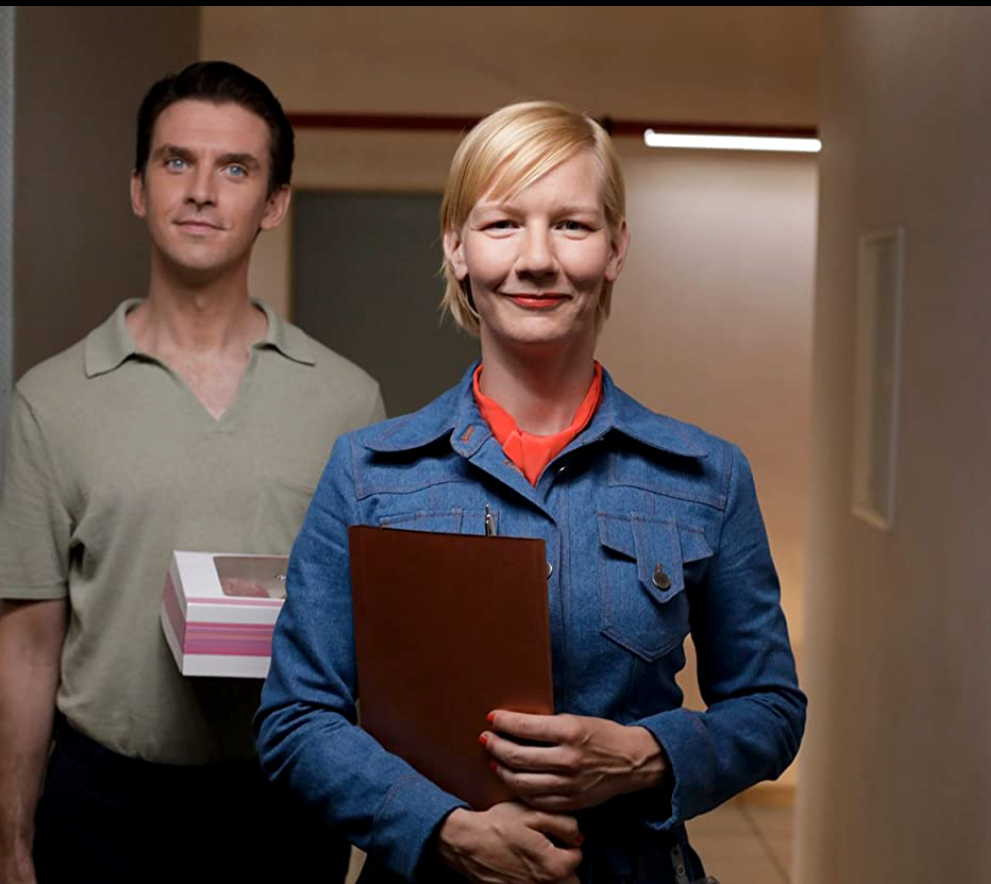While this is only Maria Schrader’s fourth directed film, it is her second submitted for the Oscar (‘’Stephan Zweig: Farewell to Europe was Austria’s submission a year ago). ‘I’m Your Man’ is a sci fi rom com and seemingly funny while surreptiously posing deeper questions about humans and our quest for love and companionship.
I’m Your Man was also the third Schrader film discussed by Kino! Film Salon, a monthly Zoom group launched in 2021 by Justine Barda, the founder and CEO of telescopefilm.com, a website for international film, offering a database of over half a million international films and series with information about the platforms to stream them in the US including a special page for German films and series where you can find a curated selection, as well as more than 30,000 German films and co-productions. It is co-hosted by Nicole Kaufmann from German Films and facilitated by Sydney Levine of SydneysBuzz.com.

The first film of Schrader discussed, Stephan Zweig: Farewell to Europe, was about the popular novelist during the Nazi era, exiled from home in Germany and living in Brazil until his death by suicide. The second was the Netflix limited series Unorthodox about a young woman who flees her ultra-orthodox community in USA and goes to Berlin to find a home. This third one, I’m Your Man, is about a woman who is taken out of her comfort zone when she is given a male robot designed to meet all her needs and desires.
In order to obtain research funds for her scientific studies, she accepts an offer to participate in an extraordinary experiment: for three weeks, she is to live with a humanoid robot, created to make her happy.
The film has a strong cast, led by Dan Stevens and Maren Eggert, and in Schrader it has one of the world’s most wanted and talented directors. Simone Baumann, head of Geman Film, said, “It’s a really good combination of talent, and a very good film, so we hope to make it at least to the [Oscar] short-list,” And it did!
While it was cast before COVID hit, it was shot at the height of the pandemic, starting in August 2020, which required special precautions. Still, you would never know that looking at the finished film, although most scenes have two or three people.
The film has been sold to more than 80 countries, making it Germany’s most successful film this year in terms of international sales, and was also one of the best received critically. It was released theatrically in the U.S. by Bleecker Street in late September, earning $261,500 in theaters which, in this time of COVID, is far from what it would normally gross.
As life partners, human beings are conditioned (the good ones, at least) to treat each other with compassion, empathy, understanding, and fulfillment. One of the key takeaways from Maria Schrader’s I’m Your Man is that, no matter how proficient someone is at meeting those desires, one person can’t be able to fully, 100%, satisfy a partner. And that’s not a bad thing (one could argue it’s why polyamorous relationships are an option, but that’s a discussion for another movie and time). It’s just the reality of life.
Many of the following points were elaborated on by the KINO! Film Salon participants in a very lively discussion.
This film goes to the extreme example of substituting a perfect artificial construct for real human interactions.
Alma is determined to approach it with a researcher’s professionalism, while coping with her recently broken heart. Alma’s ex, Julian (Hans Löw), works at the same museum institution, so running into him is painful and unavoidable. Clueless, Julian wants to be friends, which makes matters worse.

Alma (Spanish for “soul”) immediately hates Tom’s perfect ways. Initially, on meeting “her robot” Tom, Alma makes a light conversation about one of her favorite books before asking stranger questions, such as what’s on a specific page, eventually cutting deeper, asking about the letters on one of those pages. Following that, she gives Tom some mathematical equations impossible for any average person to solve without scratch paper. She even inquires as to the meaning of life, which Tom can firmly and confidently answer.
As Tom becomes more human as his programming allows, he becomes confused by her reaction, and a different type of relationship between them evolves.
Alma also doesn’t want to end up alone like her dementia-ridden father for whom she and her sister take turns providing care. Alma’s sister also has a child and judging from the bond they share, offspring becomes another vital pillar to happily ever after that Tom will likely never be able to provide.
Alma, against every impulse and better judgment, does indeed fall for the machine. Whether that’s what’s best for her or society at large is something she will have to work out in her mind.
Could IA solve our emotional issues with well-being?
HAL from 2001 comes to mind. Will our machines control us? Or do they already?
Newsweek (December 2003) wrote an article on the use of prozac to alleviate depression and referred to the “1968 novel Do Androids Dream of Electric Sheep? (which inspired the movie Blade Runner)… Philip K. Dick introduced his hero fighting with his wife over what mood to be in. The couple, living in the dreary California of 2021, is fortunate enough to own a Penfield Mood Organ, a device that allows the user to dial up any desired state of mind. A setting of 382 is tolerance and gratitude; 481 is awareness of hope for a bright future; 888 is the desire to watch TV “no matter what’s on it,” and setting 3 imparts the desire to dial. They spar over the wife’s decision to schedule, twice a month, three hours of hopelessness and despair.
What do you think accounts for the popularity of this film? Some say it is a “lightweight” film? Lighting, costumes, cinematography, settings conform to this mood of levity.
Could the circumstances of her having a broken heart, or of us living in a pandemic time of loss, might make us more likely to want IA to console us and take our mind off of our losses?
What qualities define humanity?
Tom becomes more human in the eyes of Alma. His adaptations to Alma seem to come out of empathy and kindness…is this programmable? In the end, the robot does go back to the factory that made himas Alma commands but instead goes to the spot where Alma first fell in love, knowing she will be there…

Alma examines the questions and reflects on the issues. There are open possibilities at the end of the movie, which ends on a happy note, thus comfirming its “lightness” in the opinion of some.
It is almost as if she has become addicted, like prozac in Blade Runner, and the robot satisfies her fantasies. The drug of fantasy has grabbed her. In the end, her soul interacts with reality and the robot/ AI is a fact. As an anthropologist, Alma has been finding poetry and metaphor in ancient texts and now she finds it in life. If she continues with Tom, it might open her up to a real relationship, and it would be perfect for Tom to help her father who needs him.
Aren’t we all addicted to AI by now? It has been proven that iPhones and new media have destroyed our ability to concentrate. How long can you exist without your smart phone or computer? If it is a fact, then shouldn’t we come to terms with it in a way to increase our inalienable right to pursue happiness?
Would you go on OK Cupid to find a match?
— — — — —
During this year’s Berlin Film Festival, the Best actress award went to Maren Eggert in I’m Your Man (Ich bin dein Mensch). In bestowing the award the jury said, “Her presence made us curious. Her charm made us empathic. And her palette of performing qualities allowed us to feel, laugh and ask questions. Confidently bringing to life an excellent script, supported by wonderful colleagues and her director, she created a memorable character that we can identify with — leading us to think about our presence and our future, our relations and what we really want for ourselves.”
The film also swept the German Film Awards for Best Performance by an Actress in a Leading Role: Maren Eggert, Best Direction:Maria Schrader, Best Feature: Lisa Blumenberg and Best Screenplay: Jan Schomburg and Maria Schrader.
International Sales Agent Beta Cinema has licensed film to more than 80 territories, among them: Australia/ NZ-Palace, Austria — Filmladen, Czech Republic, Slovakia — Film Europe, Denmark — Camera, France — Haut et Court, Germany —Majestic, Das Erste, Paramount Home Entertainment, Hong Kong — Huanxi, Italy — Koch, Japan — New Select, Norway — Arthaus, Scandinavia, Iceland, Baltics — Edge, Switzerland — Filmcoopi, Turkey — Filmarti, UK — Curzon, US — Bleeker Street




No comments:
Post a Comment